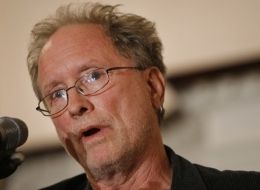 A material that can be squirted into broken bones, where it hardens within minutes, has been developed by UK scientists.
A material that can be squirted into broken bones, where it hardens within minutes, has been developed by UK scientists.
The toothpaste-like substance forms a biodegradeable scaffold over which the body's own bone grows.
 A material that can be squirted into broken bones, where it hardens within minutes, has been developed by UK scientists.
A material that can be squirted into broken bones, where it hardens within minutes, has been developed by UK scientists.
The toothpaste-like substance forms a biodegradeable scaffold over which the body's own bone grows.
People will soon be able to carry concealed, loaded guns in most national parks and wildlife refuges.
The Bush administration said Friday it is overturning a 25-year-old federal rule that severely restricts loaded guns in national parks.
TVNL Comment: How sweet. Good old Republican values.
In another regulatory action in the waning days of the Bush administration, the Interior Department on Thursday unveiled a new rule that challenges Congress’s authority to prevent mining planned on public lands.
Congress has emergency power to stop mineral development, and has used it six times in the last 32 years. The most recent was in June, when it put a three-year moratorium on uranium mining on one million acres near the Grand Canyon. Interior Secretary Dirk Kempthorne has ignored that Congressional directive, saying it was procedurally flawed.
 The killings, details of which were buried in classified U.S. files for a half-century, were intended to keep southern leftists from aiding the invaders at a time when the rightist, U.S.-allied government was in danger of being overrun by communist forces.
The killings, details of which were buried in classified U.S. files for a half-century, were intended to keep southern leftists from aiding the invaders at a time when the rightist, U.S.-allied government was in danger of being overrun by communist forces.
Family survivors last month met with the U.S. Embassy for the first time, saying afterward they demanded an apology for alleged "direct and indirect" American involvement in the killings.
Declassified records show U.S. officers were present at one killing field and that at least one U.S. officer sanctioned another mass political execution if prisoners otherwise would be freed by the North Koreans. Uncounted hundreds were subsequently killed, witnesses reported.
TVNL Comment: History shows that America has never protected "democracy" or "freedom". America has only protected "capitalism." U.S. Military actions, for the most part, have protected the profits of capitalists.
 Berkeley's City Council will delve into national policy again next week when it votes whether to demand the United States charge Berkeley resident and former Bush adviser John Yoo with war crimes.
Berkeley's City Council will delve into national policy again next week when it votes whether to demand the United States charge Berkeley resident and former Bush adviser John Yoo with war crimes.
Yoo, a tenured professor at UC Berkeley's Boalt Hall School of Law, wrote the memos offering legal justification for torture while he worked for the White House from 2001 to 2003.
The City Council will vote Monday on the five measures. In addition to demanding that Yoo be charged with war crimes, the city will decide whether to order Boalt to offer alternatives to Yoo's courses, so no student is forced to take a class from him if they don't want to. Yoo has taught constitutional and international law at Boalt since 1993.
One of the powers the U.S. military loses under the new deal is the right to detain Iraqis indefinitely without charge. That means it will have to turn the 16,000-17,000 detainees currently in its custody over to Iraqi authorities in an orderly manner. Under Iraqi law, they will have to be tried or released.
 In the recently concluded presidential race, I was unwillingly thrust upon the stage and asked to play a role in a profoundly dishonest drama. I refused, and here’s why.
In the recently concluded presidential race, I was unwillingly thrust upon the stage and asked to play a role in a profoundly dishonest drama. I refused, and here’s why.
Experts predict that as a result of the so-called JUPITER study, which seemed to show that the statin drug Crestor lowers the risk of heart attacks and strokes in those with high levels of inflammation, will lead to millions of people being put on statin drugs.
But the benefits were actually tiny -- about 0.72 percent of the statin takers in the trial had a heart attack or stroke, compared with 1.5 percent of those taking placebos.
Struggling to find enough doctors, nurses and linguists for the war effort, the Pentagon will temporarily recruit foreigners who have been living in the states on student and work visas, or with refugee or political asylum status.
Defense Secretary Robert Gates has authorized the Army, Navy, Air Force and Marine Corps to recruit certain legal residents whose critical medical and language skills are "vital to the national interest," officials said, using for the first time a law passed three years ago.
Page 1045 of 1174